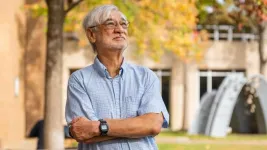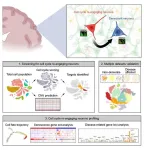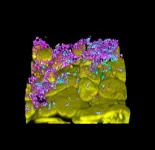(Press-News.org) Researchers have described the optimal timing for COVID-19 patients to take the antiviral, Paxlovid, to get the most benefit from the treatment, according to a study published April 16 in eLife.
The findings suggest that taking Paxlovid three to five days after COVID-19 symptoms emerge may maximise the drug’s ability to reduce viral loads, minimise viral spread and reduce viral rebound. They also indicate that broader use of Paxlovid during this window might be a powerful tool to help curb the spread of the SARS-CoV-2 virus that causes COVID-19 without the need for potential population-wide restrictions in the future, although additional studies will first be needed in this area.
Paxlovid is used in some parts of the world to protect people most at risk of hospitalisation and death from the virus. However, its uptake has been slow, and some patients have experienced rebounding viral growth after they stopped taking the medication.
“Drugs like Paxlovid that hinder the replication, or spread, of a virus within patients can improve those patients’ outcomes and reduce their infectiousness to others. They may also be administered more widely to help curb pandemic waves,” says Zhanwei Du, Assistant Professor (Research) at the WHO Collaborating Center for Infectious Disease Epidemiology and Control, School of Public Health, University of Hong Kong, and a lead author on the study. “However, to get the most out of these drugs, we first need to understand the optimal timing for taking them and to encourage their wider distribution and uptake.”
To determine the best timing for Paxlovid treatment, Du and colleagues analysed health records from 208 patients hospitalised with mild to moderate COVID-19 in Hong Kong between January 6 and May 1, 2022. Half of the patients included in the analysis (104) were treated with Paxlovid, while the other half received no antiviral treatment.
The research team used data on the patients’ viral loads to create mathematical models of the virus’ behaviour both with and without Paxlovid treatment. Their modelling suggested that the drug reduced viral replication in patients by 90% overall, but its effectiveness varied depending on when it was administered to them.
Those who received Paxlovid treatment three days after their symptoms first appeared had only a 17% chance of experiencing rebounding viral growth after they stopped taking the drug. Treatment in this window also lowered their ability to infect others by 12%, while treatment after five days of symptoms emerging had a less positive effect on their ability to infect others. Patients treated fewer than three days after symptoms began were more likely to have rebounding viral growth after stopping treatment, and the treatment did not reduce their infectiousness to others.
“Our analyses suggest that the optimal treatment window to maximise Paxlovid’s ability to reduce infectiousness and minimise rebound viral growth is between three and five days after symptoms start,” says co-senior author Lauren Ancel Meyers, the Cooley Centennial Professor at the Departments of Integrative Biology, and Statistics and Data Science, at the University of Texas at Austin, US. “The data also suggest timely use of Paxlovid could help lower the risk of SARS-CoV-2 transmission to others.”
However, the authors note that the data do not currently account for the potential emergence of resistance to Paxlovid, which they say would need to be evaluated further before the drug could be used more widely.
“Fast-acting antiviral drugs like Paxlovid have the potential to reduce SARS-CoV-2 transmission while improving patient outcomes,” concludes co-senior author Benjamin Cowling, Professor, Chair of Epidemiology and co-Director of the WHO Collaborating Center for Infectious Disease Epidemiology and Control, School of Public Health, University of Hong Kong. “The development of global distribution programs that provide rapid and equitable access to antivirals could enhance our ability to combat COVID-19 as the virus and the landscape of immunity continues to evolve.”
##
Media contacts
Emily Packer, Media Relations Manager
eLife
e.packer@elifesciences.org
+44 (0)1223 855373
George Litchfield, Marketing and PR Assistant
eLife
g.litchfield@elifesciences.org
About eLife
eLife transforms research communication to create a future where a diverse, global community of scientists and researchers produces open and trusted results for the benefit of all. Independent, not-for-profit and supported by funders, we improve the way science is practised and shared. In support of our goal, we’ve launched a new publishing model that ends the accept/reject decision after peer review. Instead, papers invited for review will be published as a Reviewed Preprint that contains public peer reviews and an eLife assessment. We also continue to publish research that was accepted after peer review as part of our traditional process. eLife receives financial support and strategic guidance from the Howard Hughes Medical Institute, Knut and Alice Wallenberg Foundation, the Max Planck Society and Wellcome. Learn more at https://elifesciences.org/about.
To read the latest Epidemiology and Global Health research published in eLife, visit https://elifesciences.org/subjects/epidemiology-global-health.
END
Optimal timing maximises Paxlovid benefits for treating COVID-19
Study suggests using the anti-COVID-19 treatment Paxlovid three to five days after symptoms emerge in patients and expanding global access to the drug may help reduce the severity and transmission of the SARS-CoV-2 virus that causes the disease.
2024-04-23
ELSE PRESS RELEASES FROM THIS DATE:
IU researchers receive $4.8 million grant to study the role of misfolded protein TDP-43 in neurodegenerative diseases
2024-04-23
INDIANAPOLIS—A new $4.8 million grant will support researchers from Indiana University School of Medicine and the Medical Research Council Laboratory of Molecular Biology to study how human neurodegenerative diseases are affected by the misfolding of the protein TDP-43. Misfolding occurs when a protein adopts a conformation which differs from the native one.
The researchers, funded by the National Institute of Neurological Disorders and Stroke, have developed an innovative approach to deciphering the role of TDP-43 misfolding in the pathology ...
DOE’s Office of Science Graduate Student Research Program selects 86 outstanding US graduate students
2024-04-23
WASHINGTON, D.C. – The Department of Energy’s (DOE’s) Office of Science has selected 86 graduate students representing 31 states and Puerto Rico for the Office of Science Graduate Student Research (SCGSR) program’s 2023 Solicitation 2 cycle. Through world-class training and access to state-of-the-art facilities and resources at DOE national laboratories, SCGSR prepares graduate students to enter jobs of critical importance to the DOE mission and secures our national position at the forefront of discovery and innovation.
“The Graduate Student Research program is a unique opportunity ...
This tiny chip can safeguard user data while enabling efficient computing on a smartphone
2024-04-23
Health-monitoring apps can help people manage chronic diseases or stay on track with fitness goals, using nothing more than a smartphone. However, these apps can be slow and energy-inefficient because the vast machine-learning models that power them must be shuttled between a smartphone and a central memory server.
Engineers often speed things up using hardware that reduces the need to move so much data back and forth. While these machine-learning accelerators can streamline computation, they are susceptible to attackers who can steal secret ...
World’s chocolate supply threatened by devastating virus
2024-04-23
A rapidly spreading virus threatens the health of the cacao tree and the dried seeds from which chocolate is made, jeopardizing the global supply of the world’s most popular treat.
About 50% of the world’s chocolate originates from cacao trees in the West Africa countries of Ivory Coast and Ghana. The damaging virus is attacking cacao trees in Ghana, resulting in harvest losses of between 15 and 50%. Spread by small insects called mealybugs that eat the leaves, buds and flowers of trees, the cacao swollen shoot virus disease (CSSVD) is among the most damaging threats to the root ingredient of chocolate.
“This ...
Wake up and die: Human brain neurons re-entering the cell cycle age quickly shift to senescence
2024-04-23
Post-mitotic neurons in the brain that re-enter the cell cycle quickly succumb to senescence, and this re-entry is more common in Alzheimer’s disease, according to a new study published April 9th in the open-access journal PLOS Biology by Kim Hai-Man Chow and colleagues at the Chinese University of Hong Kong. The phenomenon may provide an opportunity to learn more about the neurodegeneration process, and the technique used to make this discovery is readily applicable to other inquiries about unique populations of cells in the brain.
Most neurons in the ...
Phage therapy is being explored to treat multidrug-resistant bacterial infections, but what are the direct effects of phages on the human host?
2024-04-23
Phage therapy is being explored to treat multidrug-resistant bacterial infections, but what are the direct effects of phages on the human host?
This study shows that therapeutic phages can be detected by epithelial cells of the human respiratory tract, eliciting proinflammatory responses that depend on specific phage properties and the airway microenvironment.
#####
In your coverage, please use this URL to provide access to the freely available paper in PLOS Biology: http://journals.plos.org/plosbiology/article?id=10.1371/journal.pbio.3002566
Article ...
Social media use linked to tobacco initiation among youth
2024-04-23
FOR IMMEDIATE RELEASE
Tuesday, April 23, 2024
Contact:
Jillian McKoy, jpmckoy@bu.edu
Michael Saunders, msaunder@bu.edu
##
The tobacco industry has long appealed to youth through targeted marketing that glamorizes smoking with imagery of candy-flavored products, celebrity endorsements, social settings, and other enticing tactics. That marketing approach appears to be particularly effective on social media, according to a new study led by Boston University School of Public Health (BUSPH) researchers.
Published in the journal Addictive Behaviors, the study found that frequent social media use was linked to an increased risk of youth using ...
Marginalized communities developed 'disaster subculture' when living through extreme climate events, study finds
2024-04-23
LAWRENCE — Locations around the globe are experiencing climate disasters on a regular basis. But some of the most marginalized populations experience disasters so often it has come to be normalized.
A new study from the University of Kansas found residents of one Seoul, South Korea, neighborhood have grown so accustomed to living through extreme climate events they have developed a “disaster subculture” that challenges both views of reality and how social agencies can help.
Joonmo Kang, assistant professor ...
AGS honors Dr. William Hall with prestigious Nascher/Manning Award in Geriatrics
2024-04-23
New York (April 23, 2024) —The American Geriatrics Society (AGS) will honor William J. Hall, MD, MACP Emeritus Professor of Medicine at the University of Rochester this year with the prestigious Nascher/Manning Award, given biannually at the AGS Annual Scientific Meeting (#AGS24 will be held virtually May 9 – 11 (pre-conference days: Tuesday & Wednesday, May 7-8).
The Nascher/Manning Award was named in honor of Ignatz Leo Nascher, MD who was the first clinician to advocate for establishing a specialty focused on the care ...
Human Frontier Science Program: life science research addressing sustainability of living systems
2024-04-23
STRASBOURG, France, 23 April 2024 — Why do stressed bats shed more viruses? How do some key species engineer whole landscapes? How do humans and animals work in groups to solve problems, shape behavior?
These eight research projects are among the Human Frontier Science Program’s (HFSP) 93 Research Grant and Fellowship Awards recently announced to begin in 2024.
“HFSP has funded basic research in the life sciences for the benefit of humankind, and sustainability science spans some of the most complex research imaginable,” said HFSP Chief Scientific Officer Guntram Bauer. “These investigations examine highly interrelated living systems – many ...
LAST 30 PRESS RELEASES:
Yale study challenges notion that aging means decline, finds many older adults improve over time
Korean researchers enable early detection of brain disorders with a single drop of saliva!
Swipe right, but safer
Duke-NUS scientists identify more effective way to detect poultry viruses in live markets
Low-intensity treadmill exercise preconditioning mitigates post-stroke injury in mouse models
How moss helped solve a grave-robbing mystery
How much sleep do teens get? Six-seven hours.
Patients regain weight rapidly after stopping weight loss drugs – but still keep off a quarter of weight lost
GLP-1 diabetes drugs linked to reduced risk of addiction and substance-related death
Councils face industry legal threats for campaigns warning against wood burning stoves
GLP-1 medications get at the heart of addiction: study
Global trauma study highlights shared learning as interest in whole blood resurges
Almost a third of Gen Z men agree a wife should obey her husband
Trapping light on thermal photodetectors shatters speed records
New review highlights the future of tubular solid oxide fuel cells for clean energy systems
Pig farm ammonia pollution may indirectly accelerate climate warming, new study finds
Modified biochar helps compost retain nitrogen and build richer soil organic matter
First gene regulation clinical trials for epilepsy show promising results
Life-changing drug identified for children with rare epilepsy
Husker researchers collaborate to explore fear of spiders
Mayo Clinic researchers discover hidden brain map that may improve epilepsy care
NYCST announces Round 2 Awards for space technology projects
How the Dobbs decision and abortion restrictions changed where medical students apply to residency programs
Microwave frying can help lower oil content for healthier French fries
In MS, wearable sensors may help identify people at risk of worsening disability
Study: Football associated with nearly one in five brain injuries in youth sports
Machine-learning immune-system analysis study may hold clues to personalized medicine
A promising potential therapeutic strategy for Rett syndrome
How time changes impact public sentiment in the U.S.
Analysis of charred food in pot reveals that prehistoric Europeans had surprisingly complex cuisines
[Press-News.org] Optimal timing maximises Paxlovid benefits for treating COVID-19Study suggests using the anti-COVID-19 treatment Paxlovid three to five days after symptoms emerge in patients and expanding global access to the drug may help reduce the severity and transmission of the SARS-CoV-2 virus that causes the disease.


